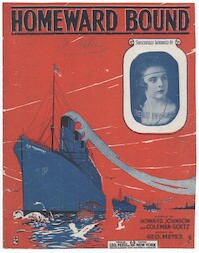"Heart of Oak" is the official march of the Royal Navy of the United Kingdom. It is also the official march of several Commonwealth navies, including the Royal Canadian Navy and the Royal New Zealand Navy. It was also the official march of the Royal Australian Navy, but has now been replaced by the new march, "Royal Australian Navy".
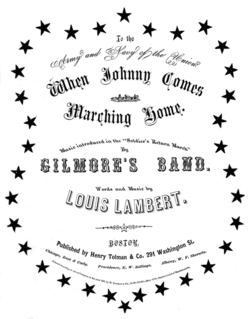
"When Johnny Comes Marching Home", sometimes "When Johnny Comes Marching Home Again", is a popular song from the American Civil War that expressed people's longing for the return of their friends and relatives who were fighting in the war.

"The Bonnie Blue Flag", also known as "We Are a Band of Brothers", is an 1861 marching song associated with the Confederate States of America. The words were written by the entertainer Harry McCarthy, with the melody taken from the song "The Irish Jaunting Car". The song's title refers to the unofficial first flag of the Confederacy, the Bonnie Blue Flag. The left flag on the sheet-music is the Bonnie Blue Flag.

"Over There" is a 1917 song written by George M. Cohan that was popular with the United States military and public during both world wars. It is a patriotic song designed to galvanize American young men to enlist and fight the "Hun". The song is best remembered for a line in its chorus: "The Yanks are coming."
The "Mingulay Boat Song" is a song written by Sir Hugh S. Roberton (1874–1952) in the 1930s. The melody is described in Roberton's Songs of the Isles as a traditional Gaelic tune, probably titled "Lochaber". The tune was part of an old Gaelic song, "Òran na Comhachaig" ; from Brae Lochaber. The song describes fishermen sailing homeward to the isle of Mingulay where their families wait.
"Rolling Down to Old Maui" is a traditional sea song. It expresses the anticipation of the crew of a whaling vessel of its return to Maui after a season of whaling in the Kamchatka Sea.
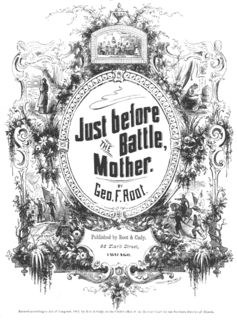
"Just before the Battle, Mother" was a popular song during the American Civil War, particularly among troops in the Union Army. It was written and published by Chicago-based George F. Root. It was also a popular song with adherents of the Primrose League in England, and was a central part of Victoria Day celebrations in Canada during the late 19th and early-to-mid 20th centuries.
Horsey, horsey is a comedy song written in 1937 by Paddy Roberts, Elton Box, Desmond Cox and Ralph Butler and which was made popular for Jack Jackson, Billy Cotton and Henry Hall.

"Hail to Pitt" is the most traditional fight song of the University of Pittsburgh, which is commonly referred to as Pitt. The saying "Hail to Pitt!" is also the most traditional and commonly used slogan of the University of Pittsburgh and its athletics teams. The slogan is frequently used in promotional material, printed on merchandise and souvenirs. It was also the title of a 1982 history of Pitt athletics by author Jim O'Brien. The slogan is often used among alumni as a statement of affiliation, including as a closing signature in conversation or correspondence between alumni, and is sometime abbreviated as "HTP" or "H2P", the latter of which is a registered trademark of the university and is frequently used on official university signage and merchandise.

"Marching Song of the First Arkansas Colored Regiment" is one of the few Civil War-era songs inspired by the lyrical structure of "The Battle Hymn of the Republic" and the tune of "John Brown's Body" that is still performed and recorded today. The "Marching Song" has been described as "a powerful early statement of black pride, militancy, and desire for full equality, revealing the aspirations of black soldiers for Reconstruction as well as anticipating the spirit of the civil rights movement of the 1960s." The song's lyrics are attributed to the regiment's white officer, Captain Lindley Miller. An almost identical song, "The Valiant Soldiers," is attributed to Sojourner Truth in post-Civil War editions of her Narrative. Recent scholarship supports Miller as the original author, or at least compiler, of the song.
"The First Gun is Fired: May God Protect the Right" was the first song written specifically for the American Civil War. It was first published and distributed three days after the Battle of Fort Sumter. George F. Root, who wrote it the day before it first appeared in print, is said to have produced the most songs of anyone about the war, over thirty in total.
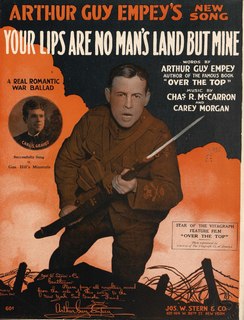
"Your Lips Are No Man's Land But Mine" is a World War I war song. It became a hit in 1918 when released by Henry Burr & Albert Campbell, charting peaking at #2 in the United States.

"Sister Susie's Sewing Shirts for Soldiers" is a World War I era song that tells about a young girl sewing shirts for soldiers fighting abroad. Her efforts are in vain however, as "Some soldiers send epistles, say they'd sooner sleep in thistles, than the saucy soft short shirts for soldiers sister Susie sews."

"Cheer Up, Mother" is a World War I era song released in 1918. Mary Earl composed the music and wrote the lyrics. Shapiro, Bernstein & Co. of New York, New York published the song. Artist Albert Wilfred Barbelle designed the sheet music cover. It features a mother saying good-bye to her soldier son. It was written for both voice and piano.
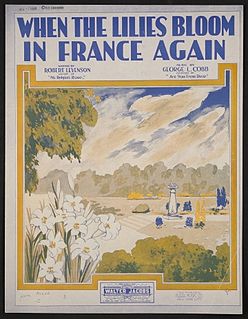
"When the Lilies Bloom in France Again" is a World War I era song released in 1918. Robert Levenson wrote the lyrics. George L. Cobb composed the music. It was published by Walter Jacobs of New York City and Boston, Massachusetts. There are two versions of the sheet music cover. One was designed by Rose Starmer. The cover is described as an "artistic words only cover." Another cover is a painting of a garden, with lilies in the foreground. The song was written for both voice and piano.

"Gee! What a Wonderful Time We'll Have When the Boys Come Home" is a World War I era song released in 1917. Lyrics and music were written by Mary Earl. The song was published by Shapiro, Bernstein & Co. of New York, New York. It was written for both voice and piano. The sheet music cover was designed by artist Albert Wilfred Barbelle. On the cover are soldiers marching down a city street. A skyline is behind them, and the lights spell out, "Welcome Home."
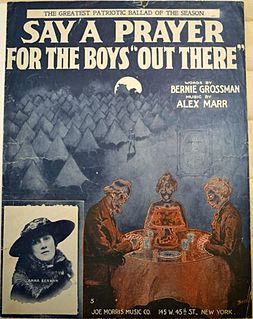
"Say a Prayer for the Boys "Out There"" is a World War I era song released in 1917. Bernie Grossman wrote the lyrics. Alex Marr composed the music. It was published by Joe Morris Music, Co. of New York, New York. The sheet music cover was designed by the Starmer Brothers. It features a family praying at the dinner table. Behind them is a sentry guarding a campground of tents. There is an inset photo on the left side that varies per edition. The song was written for both voice and piano.

"All Aboard for Home Sweet Home" is a World War I era song released in 1918. The lyrics were written by Addison Burkhardt. Al Piantadosi and Jack Glogau composed the music. It was published by Al Piantadosi & Co., Inc. of New York, New York. Artist Starmer designed the sheet music cover. It features soldiers boarding a troop transport. The Statue of Liberty is above the ship. Various editions feature different artists within the inset photo including, the Courtney Sisters, Elsie White, Salvation Army nurses, and Mel Klee.

"The Ragtime Soldier Man" is a World War I era song released in 1912 and 1917. Irving Berlin wrote the lyrics and composed the music. The song was published by Waterson, Berlin & Snyder, Co. of New York, New York. Artist Pfeiffer designed the sheet music cover. It features a U.S. soldier holding his rifle and jumping over cannon balls. The song was written for voice and piano.
